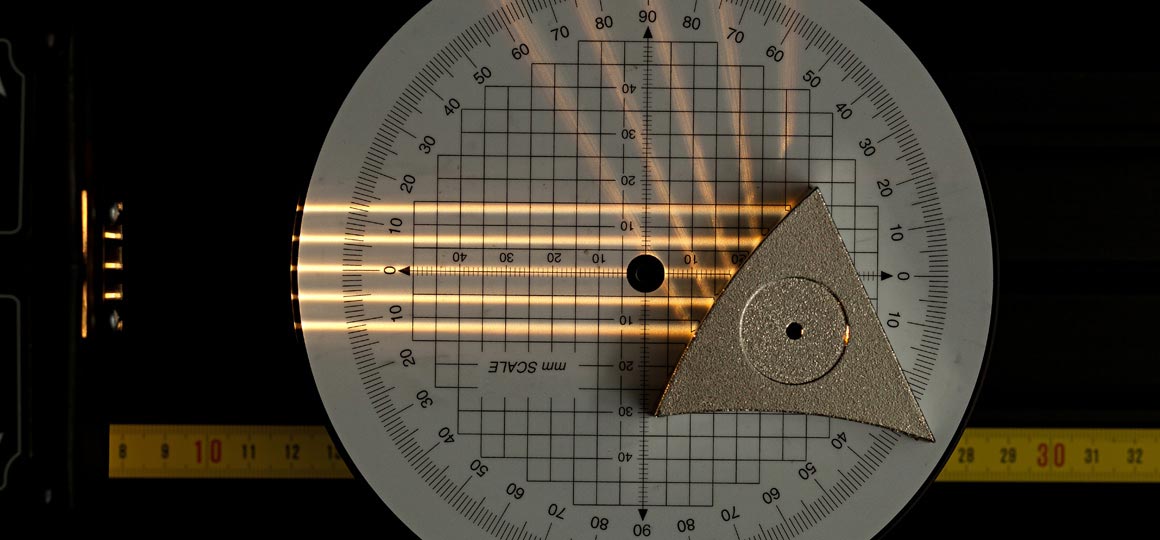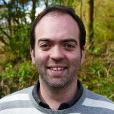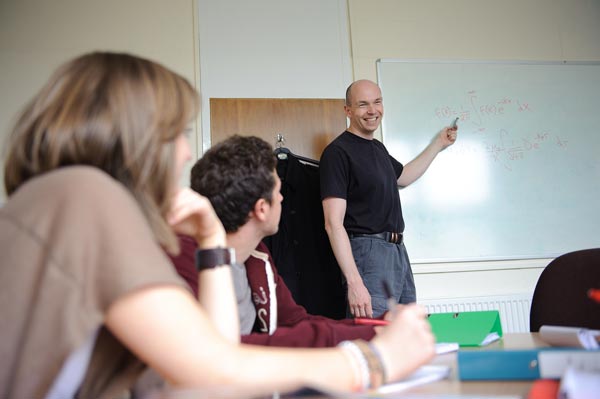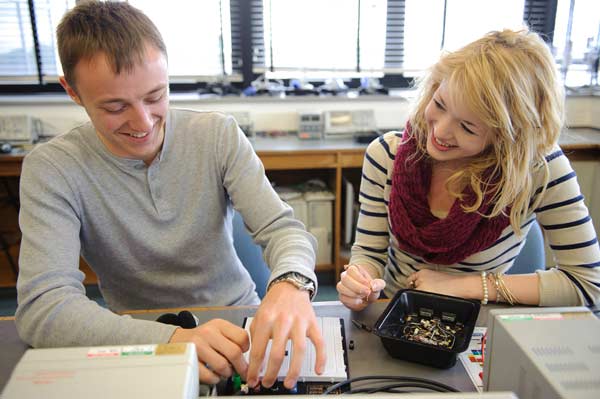View semester dates

BSc (Hons) Physics (with a foundation year)
Find your way into Physics with an intensive foundation year course
Year of entry: 2026/27
View semester dates
If you have potential but you're missing the appropriate qualifications then our foundation year course offers a route onto our physics degrees.
The course is aimed at:
- A level students who have not recently studied both physics and maths
- Mature students looking to change career
After completing the foundation year, you'll transfer into the Year 1 of a physics degree of your choice. All our degree programmes are offered as three-year Bachelors (BSc) courses or four-year integrated Masters (MPhys/MMath) courses. Many have the option to spend an additional year abroad or in industry:
- Physics
- Physics with Astrophysics
- Theoretical Physics
- Mathematics and Physics
- Physics with Philosophy
Accreditation

I am really enjoying my final year, and my whole degree has been life-changingly wonderful. I cannot imagine anywhere else I would have wanted to study. The people I have met have become the world to me, and the opportunities I have had have been rich in number and quality. Thank you York.
Course content
Our Foundation Year course is based on A level mathematics and physics material. No prior knowledge is assumed, but you will need to be prepared for a busy and demanding schedule.
We closely limit course numbers to ensure you have the best possible chance of successfully completing the foundation year. As a result we can offer small-group teaching with considerable personal support.
Foundation year
The foundation year includes modules which aim to provide the student with the relevant knowledge and skills to embark upon the first year of any of our physics courses. The taught modules broadly follow the mathematics and physics A-level syllabus, while the practical sessions provide useful experience of university laboratory work.
Core modules
Year 1
Core modules
- Classical Mechanics and Laboratories
- Classical and Quantum Waves
- Mathematical, Computational and Professional Skills 1
- Electromagnetism and Relativity
- Mathematical, Computational and Professional Skills 2
Option modules
You will study one option module. Examples can be found below. The options available to you will be confirmed after you begin your course.
Academic integrity module
In addition to the above you will also need to complete our online Academic Integrity module.
Year 2
Core modules
- Thermodynamics and Electromagnetism
- Mathematics, Professional Skills and Laboratories
- Statistical and Solid State Physics
- Quantum, Atomic, Nuclear and Particle Physics
- Advanced Mechanics, Physics Laboratories and Skills
Option modules
You will study one option module. Examples can be found below. The options available to you will be confirmed after you begin your course.
Elective modules
You may be able to replace one option module with an elective module, studying a complementary subject, a language or an interdisciplinary topic.
Year 3
Core modules
Option modules
You will study four option modules. Examples can be found below. Some option module combinations may not be possible. The options available to you will be confirmed after you begin your course.
- Plasma Physics and Fusion
- Quantum Mechanics
- Advanced Theoretical Techniques and Modelling Matter
- Stars and Galaxies
- Condensed Matter Physics: Electrons in Solids
- Relativity and Cosmology
- Medical Physics
- Nuclear and Particle
- Quantum Science and Technologies
- Mobile Communications and Internet Protocols
- Advanced Sensors and Instrumentation
- Astrobiology
- Scientific Supercomputing
Elective modules
You may be able to replace one option module with an elective module, studying a complementary subject, a language or an interdisciplinary topic.
Our modules may change to reflect the latest academic thinking and expertise of our staff, and in line with Department/School academic planning.
Learning outcomes
Every course at York has been designed to provide clear and ambitious learning outcomes. These learning outcomes give you an understanding of what you will be able to do at the end of the course. We develop each course by designing modules that grow your abilities towards the learning outcomes and help you to explain what you can offer to employers. Find out more about our approach to teaching and learning.
Learning outcomes for this course
- Apply the techniques and results of physics and mathematics to independently solve complex problems, using core physics, mathematics and/or computational knowledge.
- Construct and execute a scientific investigation using the principles of physics in investigating a hypothesis, and interpret outcomes.
- Communicate the integration and inter-relation of core physics, present sophisticated concepts and defend outcomes of physical studies succinctly in both written and oral formats to audiences in a logical way.
- Interact and collaborate effectively within groups applying core physics themes and concepts to open-ended problems.
- Use appropriate digital technologies in data handling and understand the wider applications of these techniques in quantitative science.
- Discriminate between modern experimental and measurement methods and the limitations imposed by assessment of systematic and random errors in the experimental design and execution.
Fees and funding
The fees and funding information here is for students starting in the 2026/27 academic year.
If you take a year abroad or year in industry you'll pay a reduced rate of fees for that year.
Annual tuition fees
| UK (home) | International and EU |
|---|---|
| £9,535 (TBC) | £32,350 |
The UK government has announced its intention to increase tuition fees from £9,535 to £9,790 for the 2026/27 academic year. We expect this to apply to new UK (home) undergraduate students starting their studies in September 2026.
UK (home) or international fees?
The level of fee that you will be asked to pay depends on whether you're classed as a UK (home) or international student. Check your fee status.
Fees for subsequent years
- UK (home) fees may increase within the government fee cap in subsequent academic years. We will notify you of any increase as soon as we can.
- International fees are subject to increase in subsequent years in line with the prevailing Consumer Price Index (CPI) inflation rate (up to a maximum of 10%).
More information
For more information about tuition fees, any reduced fees for study abroad and work placement years, scholarships, tuition fee loans, maintenance loans and living costs see undergraduate fees and funding.
Funding
We'll confirm more funding opportunities for students joining us in 2026/27 throughout the year.
- UK government loans
- UK scholarships and bursaries
- International scholarships
- Country-specific funding
- US loans
Masterclass Research Placements
Any student who enters stage 1 of any of our physics degrees having achieved an A* at A level (or equivalent) in mathematics or physics and achieves an overall Year Mark of 70 per cent or higher in stage 1 in their first attempt is guaranteed a Masterclass Research Placement.
In addition, a number of Masterclass places will be made available to students who did not qualify based on entry qualification, but who achieve an overall Year Mark of 70 per cent or higher in stage 1 in their first attempt and have demonstrated significant improvement in their abilities during their first year of study.
Foundation year scholarships
The School of Physics, Engineering and Technology offers a number of scholarships for the best performing foundation year students, after the first semester of the course.
York, Oxford, Cambridge, Imperial
Just four UK universities are rated Gold for teaching and top ten for research* in the latest national assessment exercises.
* Awarded joint 10th in the Times Higher Education ranking of the Research Excellence Framework 2021.
Teaching and assessment
You’ll study and learn with academics who are active researchers, experts in their field and have a passion for their subjects. Our approach to teaching will provide you with the knowledge, opportunities, and support you need to grow and succeed in a global workplace. Find out more about our approach to teaching and learning.
Teaching format
We teach using a combination of lectures, example classes, laboratory work, workshops and private study.
You'll meet regularly with an academic supervisor who will offer guidance and support throughout your degree and help develop your problem-solving skills. This fosters excellent staff-student rapport and ensures an extremely friendly and supportive atmosphere for you.
Regular supervision meetings, small group seminars and our open door policy allow you to share your insights and develop a deeper understanding.
Timetabled activities
In your first year, you can expect:
| Lectures | 15 hours per week |
|---|---|
| Workshops | 2 hours per week |
| Practicals | 2-8 hours per week |
These figures are representative of a typical week. Your contact hours will vary throughout the year due to your module choices, non-compulsory classes, exam periods and changes to scheduled activities.
Outside your timetabled hours, you'll study independently. This may include preparation for classes, follow-up work, wider reading, practice completion of assessment tasks, or revision.
In the UK, full-time students are expected to spend 1,200 hours a year learning. That's about 40 hours of classes and independent study each week during semesters. Everyone learns at a different rate, so the number of hours you spend on independent study will be different to other students on your course.
Teaching location
You'll be based in the School of Physics, Engineering and Technology on Campus West. Most of your teaching will take place in the School, with some classes elsewhere on Campus West.
About our campus
Our beautiful green campus offers a student-friendly setting in which to live and study, within easy reach of the action in the city centre. It's easy to get around - everything is within walking or pedalling distance, or you can use the fast and frequent bus service. Take a campus tour.
Assessment and feedback
You'll be marked on regular problem exercises and laboratory work, coursework and formal report writing throughout the semester. We balance various types of more formal assessment to develop and test your different strengths:
- Examinations
- Extended assignments
- Weekly problems
- Formal reports
- Practical laboratory work
- Presentations
You'll get prompt, regular feedback to help you develop your skills.
Careers and skills
Our graduates are sought by employers in a huge range of disciplines. The skills you will learn - analysis, mathematics, problem-solving - are relevant in industries from finance to software development. This is supported by a central careers service, but also within the school through our contacts with industry. Alternatively, many of our graduates progress to postgraduate degrees at York and other leading universities.
We're committed to supporting our students' career development and employability - it's embedded in our core teaching. We organise activities from careers fairs to leadership building exercises to ensure you're prepared to enter the jobs market with a competitive edge.
Companies that York physics graduates have gone on to work for include: BAE Systems, E.ON, De Vere, The Home Office, Jaguar Land Rover, John Lewis, the Science and Technology Council, and Virgin Money.
Career opportunities
Our graduates are working as:
- accelerator physicist
- engineer
- scientist
- financial coordinator
- IT analyst and consultant
- teacher
- electrical engineer
- environmental modeller
- accountant
Transferable skills
- Self-management
- Communication skills
- Team working
- Problem solving
- Creativity and innovation
- IT literacy
- Mathematics
Entry requirements
| Qualification | Typical offer |
|---|---|
| Other qualifications | We are eager to encourage applications from a wide range of backgrounds, so we consider every application individually. In order to help ensure that you have the potential to complete the degree course, we will look for evidence that you are capable of dealing with the foundation year workload. For example, you could have successfully completed three A levels, or have been in full-time employment for an extended period. |
| Other international qualifications | Equivalent qualifications from your country |
Additional requirements
We typically expect applicants to have GCSE Maths at grade 5 (or equivalent). We consider applicants from a wide range of backgrounds and holding combinations of qualifications. Please get in touch with us for an informal discussion if you are interested in our foundation year but are unsure whether you meet our criteria.
Applicants are usually interviewed and we will look for evidence during our discussion that you are capable of dealing with the workload of the foundation year.
Alternative offers
Meeting the following additional criteria may qualify you for an alternative offer.
| Criteria | Adjustment |
|---|---|
| Widening participation | BCC This is conditional upon successful completion of the WP programme including the YorJourney module (Black Access Programme, Next Step York) or successful completion of Realising Opportunities More about widening participation. |
| Contextual offer | BBC |
| EPQ | If you achieve C or higher in the EPQ, you may be eligible for an alternative offer up to one A level grade (or equivalent) below our typical offer. |
English language
If English isn't your first language you may need to provide evidence of your English language ability. We accept the following qualifications:
| Qualification | Minimum requirement |
|---|---|
| IELTS (Academic) | 6.5, with a minimum of 6.0 in each component |
| IB English | A score of 4 in English A or 5 in English B (Higher Level or Standard Level) |
| Cambridge CEFR | 176, with a minimum of 169 in each component |
| Oxford ELLT | 7, with a minimum of 6 in each component |
| Oxford Test of English Advanced | 136, with a minimum of 126 in each component |
| Duolingo | Integrated subscores: 120 overall, with a minimum of 105 in each component |
| GCSE/IGCSE/O level English Language (as a first or second language) | Grade C / Grade 4 |
| LanguageCert SELT | B2 with a minimum score of 33/50 in each component |
| LanguageCert Academic | B2 with a minimum score of 33/50 in each component |
| Kaplan Test of English Language | 478 Main Flight score with 444 in each component |
| Skills for English | B2: Merit overall, with Pass with Merit in each component |
| PTE Academic | 61, with a minimum of 55 in each component |
| TOEFL | 87 overall, with a minimum of 21 in each component (taken before January 2026) 4.5 with 5 in Listening and 4.5 in each other component (taken after January 2026) |
| Trinity ISE III | Merit in all components |
| Other English language qualifications | We also accept other English Language qualifications, including various school-leaving certificates. |
For more information see our undergraduate English language requirements.
If you haven't met our English language requirements
You may be eligible for one of our pre-sessional English language courses. These courses will provide you with the level of English needed to meet the conditions of your offer.
The length of course you need to take depends on your current English language test scores and how much you need to improve to reach our English language requirements.
After you've accepted your offer to study at York, we'll confirm which pre-sessional course you should apply to via You@York.
Next steps
Contact us
Get in touch if you have any questions

Discover York








